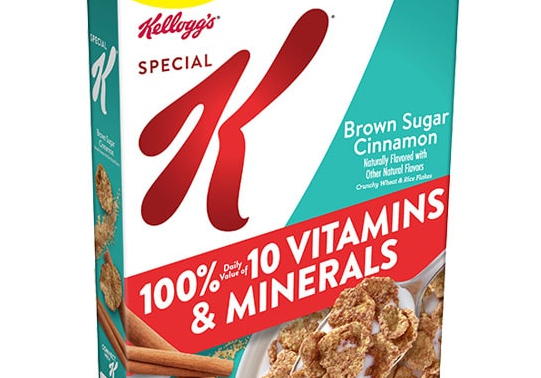Kellogg’s founder, Dr. John Harvey Kellogg, was a physician, sanitarium director and nutritionist. He invented flaked breakfast cereal in 1906 and the first meal of the day was never the same again. The medicinal origins of flaked cereals has surfaced in the latest version of Special K…

New Special K Brown Sugar Cinnamon claims – via a bold red banner across the waist of the box – to bring you ‘100% daily value of 10 vitamins & minerals’. Fortified breakfast cereals aren’t new, by any means. But this development seems to signal a change, not necessarily for the better, in the eating habits of the masses. I’ll explain later.
First, a look at the Nutrtition Facts…
The full-length Nutrition Facts ‘Smart Label’ listing for the new Special K reveals some interesting facts:
- The 10 vitamins and minerals present in amounts equal to 100 percent of your daily requirement include: vitamins B6, B12, E, Thiamine, Riboflavin, Niacin, Folate, Pantholenic Acid, Iron and Zinc.
- Other vitamins and minerals present in lesser amounts include: vitamins A, C, and D, Calcium and Potassium.
- There is enough added sugar to account for 20 percent of your daily allowance. If Kelloggs hadn’t added it, the cereal would be sugar-free. But I suspect it would be unpalatable. There are limits to every manufacturer’s health commitments. And don’t forget, consumers usually add more, by the spoonful, at the breakfast table. They’d probably just add even more, if the cereal itself was sugar-free.
- On the other hand, Special K Brown Sugar Cinnamon contains: zero cholesterol, only 0.5 g total fat (none saturated), 3 g protein and 3 g fibre (12 percent of daily allowance).
My take
The only thing on the SmartLabel list that bothers me is the added sugar, but I’ve already discussed my issues with that. Otherwise, the new Special K appears to be a good, responsible, healthy take on breakfast.
What bothers me a lot is the underlying message the product carries: Adding all those nutrients – in doses providing 100 percent of your daily requirement – Kellogg’s is saying it’s okay to eat stupidly, carelessly; that you can stuff whatever other junk into your body you want all day long, as long as you start the day with its miracle cereal. For a company that was founded by a doctor and nutritionist, with the aim of providing America and the world with the most nutritious breakfast cereal Dr. Kellogg could devise, Kellogg’s has veered a long way of course. It’s one thing to step up and support good nutrition by fortifying a breakfast cereal. But it’s quite another to aid and abet the development of bad eating habits by, essentially, telling folks they don’t have to care about what they eat. To abandon responsibility for their own health and well being. And that of their families.
If Kellogg’s has the ability to ultra-fortify its leading non-corn breakfast cereal, it should also have the ability – and accept the responsibility – to educate its customers as to why they need those extra nutrients, and at least present alternatives that involve the Canada’s Food Guide recommendations for proper nutrition: more fresh fruits and veggies, fewer proteins, and a significant increase in your consumption of whole grains.
One final thought: Survey after survey has shown that millennials and those who’ve come after them are leaning more and more on convenience foods and order-in meals for their primary sustenance. They’re eating less and less fresh food and missing out on nutrients they would otherwise get if they made their own meals from fresh ingredients. And Kellogg’s is saying that’s okay. Let Big Brother look after you…
~ Maggie J.

